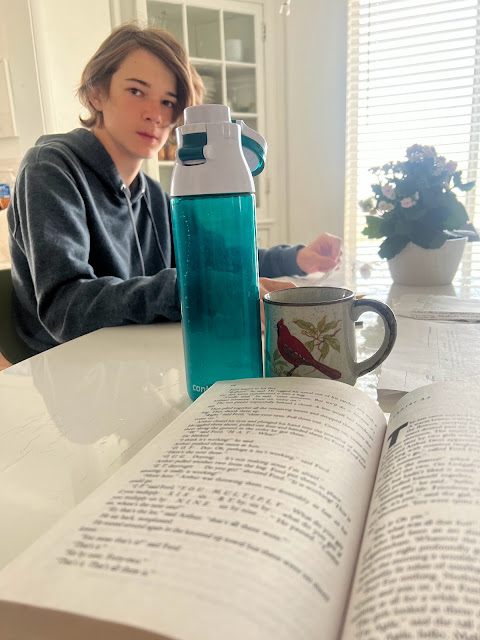A Day In the Life of Lani: Home Schooling Mother

“Let him kick up his heels,” he thought, “and run away. Leave him build his flutter-mills. The day’ll come, he’ll not even care to.”
Childhood is brief. Children need time to think, to sit on the grass unhurried each day and dream. We’ve found learning occurs in spite of us. Children learn quite naturally, even without worksheets or timelines or tests. They desire to read and write as they see us reading and writing. Our time together at home is also brief—so we’ve chosen to spend a bit more of this short time together
I’ve long since past the point of desiring or even trying to persuade others as to the merits of home schooling. I’ve been doing this long enough that all romantic notions regarding home schooling have long since left my mind. It is the hardest work I have ever done or ever will do, I am convinced. It brings my greatest joys and my greatest sorrows. It’s something I have never been more sure of, and, at times the biggest doubt that looms above my horizon. It energizes me and exhausts me at the same time. I don’t recommend it, I say, partly in jest. Then why do I do it? I think simply because it feels right in my gut.
When people hear the word “home school,” they usually respond by saying they knew one family that home schooled—and they were, well. . . weird. It’s true that as a home schooler you know that any quirks or deficiencies you or your children have will be explained by a simple knowing explanation, “oh, they’re homeschoolers.” Whereas other public school children’s quirks are often shrugged off with “kids will be kids,” or “they’ll grow out of it.” The argument that public school children are better socialized just doesn’t seem logical to me as I know plenty of people who attended public school who seem to have their fair share of social quirks and challenges. It seems that most children learn their social skills from their parents and families, rather than learning it outside the home. So, yes, we all have our irregularities, thank heavens, home or public schooled, and we all have our opposition.
_______________________________________________________
Mornings
We begin the day hopeful and full of energy. It seems the children have clean slates, their memories washed clean of any discord the day before may have held. One great benefit of being at home is that we can linger longer in the morning, spending a few more minutes in bed. Of course Dad has left for work long before we wake. If the toddlers and even the older children crawl into my bed in the morning, I can, if we choose, linger and talk together, cuddle or read a bit without the rush or the stomach worry, as I came to know it, in my own early years of hurrying to go to school.
After the bookwork and practicing, during which I am alternating between helping my three year old color and read books, keeping the baby happy, and picking up the kitchen. Then, we usually do our read aloud. I try to always be reading a classic book to the children. Right now we’re reading Carry on Mr. Bowditch, by Jean Lee Latham, the story of a boy during the Revolutionary War. We have learned much about the late 1770’s by reading this book. I can usually read a chapter or two before the toddlers cry mutiny.
After book work, instruments, and reading aloud, there’s not much time until lunch. The house usually needs a pick up by this time because of the three year old and baby searching and destroying while the three older children are working at the table.
Some afternoons we have piano or violin lessons, club meetings, or errands. We try to keep these to a minimum. If the afternoon is spent at home we’ll have mostly free time. For me, that means phone calls, cleaning, laundry and yard work. I try to have the children help. Lilian usually spends her free time reading or sewing or helping with the babies. Truman reads, draws, and prepares for book discussions that he and dad have on Saturdays. They have household chores to do too. Their time is also interspersed with a fair share of arguing with each other. Henry plays with Legos most of his waking hours. Lucy, three, usually watches a show or two in the afternoon, and Lincoln, the baby naps some of the time. This is also the time for playing outside, friends to come over, or to go to friends houses.
Nights
Dinner, of course, and “whose night for dishes is it?” And if time allows, by far the sweetest and most favorite time of our day is when Dad reads aloud to us. Along with the book that Mom is reading, Dad is usually reading another classic at night. Between work, church, and community obligations, we average probably four nights a week of actually being able to read. Most recently, Dad has read In His Steps, by Charles Sheldon. We sit in the family room and listen. Because bed time looms near, the children are more than happy to stay up as long as Daddy will allow and listen as he reads. We have cried and laughed our way through so many wonderful books this way. This has created quite extensive vocabularies for our children—they often surprise grandparents and friends with their use of vocab.
What about you--how do you come to peace with your efforts at parenting?

